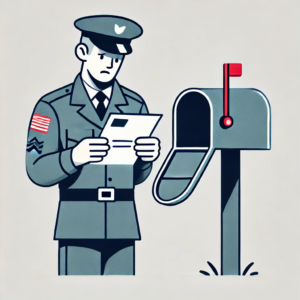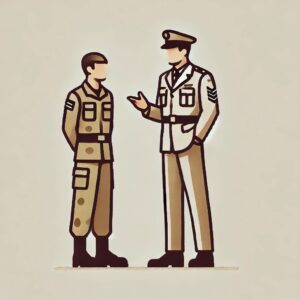 How Wage Garnishment Affects Military Personnel
How Wage Garnishment Affects Military Personnel
If you’re facing wage garnishment while serving in the military, you may be wondering how wage garnishment for military personnel differs from the process for civilians.
Even as you’re serving your country, you can face financial challenges like anyone else. One of the toughest situations is wage garnishment, where a portion of your paycheck is withheld to pay off a debt.
And for military personnel, wage garnishment can be especially complicated because of all the specific rules that apply to your wages and financial obligations, let alone deployment.
Whether you’re dealing with commercial debt or unpaid child support and alimony, it’s important to understand your rights and options.
How Does Wage Garnishment Work for Military Personnel?
Wage garnishment happens when a creditor legally takes a portion of your earnings to pay off a debt. For military personnel, this process is a bit different compared to civilians.
Your wages are government-issued, and there are federal laws that govern how much can be garnished. But the rules can vary depending on the type of debt.
1. Commercial Debt
Commercial debt includes credit cards, medical bills, car loans, and mortgages.
If you owe money on these types of debts, creditors have to get a court order before they can garnish your wages.
Once they get the order, your employer – in this case, the federal government – will withhold a portion of your paycheck. Typically, no more than 25% of your disposable earnings can be garnished for a commercial debt.
 2. Child Support and Alimony
2. Child Support and Alimony
The rules for child support and alimony are stricter:
- Unlike commercial debt, child support and alimony garnishment doesn’t always require a court order.
- If you’re behind on these payments, federal law allows up to 60% of your disposable income to be garnished (or 50% if you’re supporting another child or spouse).
- These garnishments can continue until the debt is paid in full.
In either situation, if you have a lot of debt you can’t pay back, you might want to speak with an attorney about your options.
Do Creditors Need Special Permission to Garnish Wages for Active Duty Military?
Even if you’re on active duty, creditors generally don’t need special permission to garnish your wages. But there are some legal protections in place.
The Servicemembers Civil Relief Act (SCRA) provides certain protections for debts you incurred before your active duty service. For example, the SCRA can temporarily halt or reduce interest rates on debts you have from before your time in the service. But it doesn’t completely prevent wage garnishment if a creditor already secured a court order.
For commercial debts you take on while on active duty, creditors have to follow the same procedures as they do with civilian debt, which means they need to get a court order and can then garnish your wages.
What About If You’re Serving Overseas?
Let’s say you have $10,000 in credit card debt, couldn’t make the payments, and then get deployed?
Military serving in a foreign country are exempt from garnishment. The government understands you’re under enough stress in that situation. And you need to focus on the mission in front of you so you can get home safely.
Just bear in mind that, once home, the debt will become an issue again. You’ll need to handle it in some way very soon after your return.
 Can the Military Punish You for Unpaid Debts?
Can the Military Punish You for Unpaid Debts?
The military pays close attention to the financial well-being of its personnel. It expects its service members to maintain good financial standing. And financial irresponsibility can be seen as a risk to operational readiness and security.
So while wage garnishment itself won’t necessarily lead to military punishment, consistent financial issues – including unpaid debts – can raise concerns. It could negatively affect your career in a few ways:
1. Initial Conversations
If your commanding officer (CO) gets a letter that you owe money, they may call you in and tell you to take care of the problem.
As a Marine Lieutenant, I had this role. It was incredibly hard, because everyone I spoke with was already dealing with so much pressure, and simply couldn’t afford to pay back the debt.
It’s frustrating to hear “you need to deal with it” about debts you know you can’t pay – and it’s also frustrating to have to say it to someone. It helped a lot when I became a bankruptcy lawyer and was able to help people actually get a fresh start.
2. Security Clearance Issues
Financial problems can result in the loss or denial of a security clearance. That’s because the military views financial instability as a potential risk because it could make you more vulnerable to coercion or fraud.
I talk about this sometimes with bankruptcy clients who are afraid of losing their jobs. In general, employers feel much better about someone who’s dealt with their debts than someone who hasn’t and desperately needs to. And the federal government is no exception.
3. Administrative Actions
In some cases, the military might take administrative action against you if they believe your debt is affecting your performance or professionalism. You could receive counseling or even face disciplinary measures if the problem is deemed serious enough.
To make sure this doesn’t happen to you, it’s important you take care of your debt before it gets out of hand. Fortunately, you do have options.
 How Bankruptcy Can Help Military Personnel Facing Wage Garnishment
How Bankruptcy Can Help Military Personnel Facing Wage Garnishment
If you’re dealing with wage garnishment, filing for bankruptcy can help. Bankruptcy triggers something called an “automatic stay.” This court-imposed order immediately stops most wage garnishments and gives you the chance to reorganize or discharge your debts.
Here’s how the two different types of bankruptcy can help:
Chapter 7 Bankruptcy
If you’re dealing with garnishment for debt like credit cards or medical bills, Chapter 7 bankruptcy can discharge these debts altogether. Creditors won’t be able to garnish your wages for these debts anymore. This can give you a totally fresh start and free up your finances to deal with other expenses.
Chapter 13 Bankruptcy
If you’re facing garnishment for child support or alimony, Chapter 13 helps you catch up. Under Chapter 13, you create a repayment plan that allows you to pay your back-payments and protect your assets.
During this time, your creditors can’t garnish your wages
 A Veteran to Help You Get Out of Debt for Good
A Veteran to Help You Get Out of Debt for Good
Wage garnishment is a serious issue for anyone, but it can be especially challenging for military personnel. Having served as a Marine myself, I understand the enormous pressure you’re under and how impossible debt can feel.
But you don’t have to face this alone. Our Memphis bankruptcy lawyers can help you stop wage garnishment and get your financial life back on track.
If you’re dealing with wage garnishment, don’t wait. We offer a free consultation, where we can explore the best ways to protect your paycheck, your military career, and your financial future.
Contact me today, and we’ll help you stop wage garnishment and get a fresh start.
